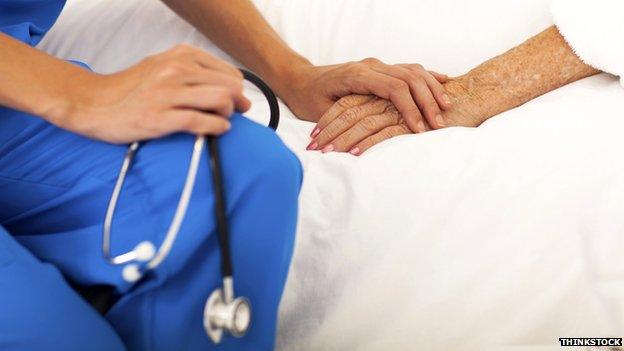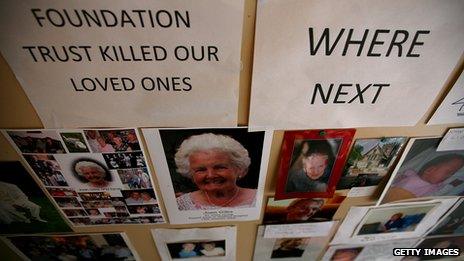A Point Of View: How important is compassion in healthcare?
- Published

Parts of the NHS have come under fire in recent months, with David Cameron among those calling for health professionals to show more compassion. But Tom Shakespeare asks if there are dangers in placing too much emphasis on empathy.
A few months ago, I found myself interviewing would-be medical students. When each young person came to my station, my task was to ask them to define empathy and to give an example of when someone had failed to display this quality.
Almost without exception, the candidates were able to do this. So far so good, and I filled in the marking sheet accordingly.
But the next question stumped me. I had to record whether I thought the student would make a compassionate doctor. The options were "no", "possibly", and "definitely". But how could I tell, on the basis of a seven-minute conversation?
In almost every case, I ended up ticking the box marked "possibly". It also reminded me of a famous gag from George Burns: "The most important thing is sincerity. If you can fake that, you've got it made."
Now, it's clearly important that doctors and other health professionals can display empathy and behave compassionately. Recent scandals at Stafford Hospital and Winterbourne View show the impact on patients when things go wrong.
At Winterbourne View, vulnerable people were mocked and even tortured by the very staff who should have been supporting them. Eleven workers were convicted, and six went to prison.
Death rates at Stafford Hospital were found to be much higher than at other comparable hospitals. Patients were left sitting in their own urine and were forced to drink out of flower vases from lack of effective nursing care.
In February the Francis Report made 290 recommendations to avoid any future breakdown of standards. Some critics think that this amounts to micro-regulation. They argue that instead of a box-ticking culture, we need ethics-based care and self-regulation.
The prime minister seems to agree, saying that "nurses should be hired and promoted on the basis of having compassion as a vocation and not just academic qualification". He also thinks that nurses should serve their time as care assistants before they even start their training.

There are a number of reasons to be cautious about this approach. I've mentioned that it's very difficult to detect which prospective doctors and nurses will be compassionate. Second, it's not obvious that we can even teach people to be genuinely empathetic or compassionate. Third, it would be rather difficult to measure and reward compassion during the practice of care.
What would it mean to incentivise or monetise compassion? It sounds like a contradiction in terms.
What goes wrong, in places like Stafford Hospital, is only indirectly about compassion. The real problem is usually systemic. It's very hard to maintain professional standards if you are under-resourced and poorly led.
The doctors and nurses at that hospital were no less moral than their colleagues in other units. It is more likely that they became ground down and demotivated by failings across the organisation. My colleague, the medical ethicist Anna Smajdor, thinks that it's dangerous to rely on compassion as the motivation to ensure that essential tasks are carried out.
"Reminders, routines and checklists are alternative, and effective, ways of ensuring that crucial healthcare tasks are undertaken, without relying on compassion or other feelings to motivate the staff involved," she says.
Rather than emphasising compassion, many medical educators would say that their priority is to ensure that professionals have sound medical knowledge. After all, when it comes to heart surgery, most of us are less concerned about whether a doctor is kind and more worried about whether they know what they are doing and have great outcomes statistics. In a crowded medical school curriculum, ensuring that doctors learn the core clinical skills comes first.
I would also add that in the disability movement, we are rather suspicious of compassion. Activists sometimes wear T-shirts with the slogan "Piss on Pity". Disabled people do not want people to feel our pain, we want them to get off our backs. Another relevant motto is that professionals should be "on tap, not on top".
Non-disabled people may imagine what it's like to have an impairment, thinking how dreadfully tragic it must be. But, actually, they are just projecting their own fears and ignorance, letting their moral imagination run away with itself. The evidence proves that most disabled people are well-adjusted and report a good quality of life.
Empathy and compassion are only good up to a point. The health professional who feels our pain most is likely to be the one who burns out first.
Professionals encounter so much misery and misfortune in their daily practice that they need to develop a thick skin in order to go on doing what they do. The surgeon who cuts into your body or brain would be unable to do this if they thought too much about the real-life human being that they were hacking. A measure of objectivity and distance is required.
The psychologist, Paul Bloom, writing recently in the New Yorker, external, suggested that empathy was a poor guide to moral judgement. Rather than using our heads and looking at the evidence, our hearts are moved by emotive stories.

Local incidents inevitably provoke a strong emotional response
Reports about individual tragedies close to home have more impact than hundreds of thousands being killed in a far off land. This results in actions that turn out to be parochial, narrow-minded and innumerate. Bloom concluded that "empathy will have to yield to reason if humanity is to have a future".
So there are powerful arguments against relying principally on empathy or compassion. But I want to take Aristotle's middle way in this debate. I come from a family of doctors and nurses, although my own experience comes from being a patient and from teaching health professionals. So I can see things from both sides.
Focusing just on doing tasks and following rules efficiently and effectively is not enough either. The Dutch theologian Henri Nouwen, in his book The Wounded Healer, writes: "How many leave hospital healed of their physical illness but hurt in their feelings by the impersonal treatment they received; how many return from their consultations with psychiatrists, psychologists, social workers or counsellors, increasingly irritated by the non-committal attitude and professional distance they encounter?"
This reminds me of a medical colleague. She told me about a consultant who said: "I find the ward round goes much faster if you don't talk to the patients."
We need health professionals who are technically competent, but who can also demonstrate the virtues of compassion and empathy. In most of medicine, technical versus caring skills is a false dichotomy. Changing a bed pan or taking a blood sample are not simply objective tasks. You can do them in ways which are empowering and soothing, or you can do them in ways which are demeaning and disrespectful.

It's not what you do, it's the way you do it
There is no contradiction between teaching students to demonstrate empathy and ensuring that they know the technical stuff. We need our healthcare workers to learn both aspects of the healing arts.
Of course, some doctors and nurses will be better at the caring part, and some will be better at the technical part. That's why there are different specialisms. If you don't have good people skills, then go into pathology or microbiology, or become a theatre nurse.
It's also why there are teams. One hopes that the brilliant but brusque cardiac surgeon is accompanied by a nurse or a junior who can translate their opaque communications into plain English and provide the element of kindness which may be lacking in their boss.
The importance of teamwork is another reason why we need doctors who can get on with other people. They are going to have to work with their juniors, with other specialisms, and with other professionals such as nurses. If they can't maintain good relationships with their colleagues, or if they are despised and mistrusted, this will translate into low morale and poor patient care.
The emphasis on technical skills also obscures a key point about modern medicine, one which students find difficult to absorb. The vast majority of clinical interactions are not particularly related to technical matters.
Except for the tiny percentage of the time when you are in surgery or on life support, healthcare is more about listening and communicating. As one doctor said to me: "The majority of medicine is making reassuring noises." This is particularly the case in specialisms such as general practice, geriatrics, rehabilitation, and psychiatry.
I do not want my health professional feeling sorry for me. But I do want them to realise how things feel, from my point of view, which entails them taking time to listen to me respectfully and react empathetically.
It may be routine for the health professional, but this is the first time you've had an operation, or the first time your partner has been pregnant. Rather than being impatient or dismissive, I want them to take a moment to realise how it is for us. And if they don't know, they could always ask.